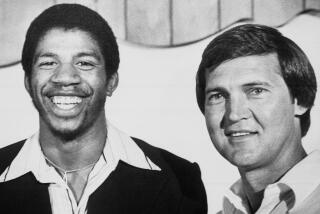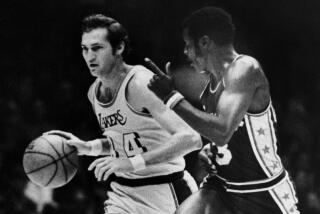NBA FINALS : A Fo-Fum Series : Ewing’s Goose Eggs Aren’t Golden as Olajuwon Controls the Beanstalk
- Share via
HOUSTON — Once upon a time in the busy kingdom of New York, there lived a giant possessed of such power and grace, the villagers chose him to represent them in games against the other villages.
The giant was shy and soft-spoken and hated standing out in crowds. However, he was good at games and liked the coins he earned by the cartload.
Unfortunately, the other New York players weren’t very good and New York always lost. Other giants claimed the golden ring, such as the wicked Bill Laimbeer from the duchy of Detroit and the creaky Bill Cartwright of Chicago.
Since New York was the biggest village of all, this was difficult to accept. The villagers wept and cursed their giant sometimes, although he was powerless to do more.
He tried not to hold it against them. He knew their lives were hard, living all packed in on top of each other, and they got crazy about their games.
They besieged him with their entreaties.
He never knew what to say.
The process continues to this day.
*
It’s a mad, mad world for New York’s Patrick Ewing, matched against Hakeem Olajuwon, the world’s very finest giant, and losing.
In Ewing’s last game, he went six for 20. He had 20 misses in Game 3 and 20 more in Game 4. He is shooting 36% in this series and getting outscored by Olajuwon, eight points a game.
“Hakeem’s playing ball,” Ewing says. “I’m playing ball, the Knicks are playing ball, Houston’s playing ball. That’s it.
Is he surprised?
“Yeah. I’m just missing shots. I think I’m getting good shots, just missing them.”
How has Olajuwon dominated him?
“Well, I think I’m playing an all-around game. Everybody’s been making a big thing out of my scoring. I think I’m playing an all-around game. I’m rebounding. I’m blocking shots. I’m playing good defense.”
He knows Game 7 Wednesday night will affect the way the world looks at him. Does he ever think about that?
“No,” he says with a laugh.
Can he put into perspective what this game means to him?
“It means a lot. I’m tired of answering--hey, you guys, I’m answering the same questions over and over again. It means a lot. It’s been a long time coming. Just have to come out and get the job done on Wednesday. Thanks, folks.”
Ewing ambles off, 12 minutes into the 30-minute media session. It’s about his average departure time.
*
This is actually Ewing at his most public.
In his first nine seasons, before the Knicks made an NBA finals in which players are ordered to attend media sessions, he rarely gave interviews on days off.
He talked after games. He was never rude but never expansive, either.
When reporters went away, he was down to earth. Those meeting him always said the same thing, how surprised they were.
“I always thought he was cold,” says Doc Rivers, who joined the Knicks last season.
“But he’s not that at all. He’s very open with the team, laughing all the time. People assumed I knew him because I play in the league, but you don’t.”
On the U.S. Olympic team in 1992, Larry Bird was stunned to learn how nice Ewing was. They are still close friends.
But it’s not easy getting that close.
Born in Jamaica, Ewing arrived in Boston when he was 11. He had a heavy accent and towered awkwardly above everyone.
“Everyone looked at me like some kind of freak,” he once told the Boston Globe’s Jackie MacMullan. “The older guys taunted me. They told me I would never be anything. They said I would never learn the game.
“At first, I couldn’t understand why they said those things. But I got used to it. And I learned not to let what anyone said affect me.”
He became a star at Cambridge’s Rindge & Latin High, the first prep ever to be invited to try out for the U.S. Olympic team. He was cut, but didn’t embarrass himself.
Ewing was an average student but his coach, Mike Jarvis, drafted a list of requirements of colleges recruiting him: Patrick had to be given untimed tests. He had to be allowed to tape lectures.
The list somehow became public, leading to a common misperception: Patrick can’t read--which became the chant when his team played at Boston College, which he had rejected when he chose Georgetown.
Ewing spent four stormy years at Georgetown. Taunts from opposing fans crossed the line into racism. Thompson’s program, which had once been merely protective, closed around Ewing and was derided as Hoya Paranoia.
Thompson played physical basketball and was not one to back down, and his teams duked their way through the early ‘80s. Once at Boston College, Ewing fought 5-foot-10 Michael Adams.
“I couldn’t believe it when I got to the NBA and I finally talked to him,” Adams said. “He was a totally different person. Calm. Very nice. I told him, ‘Man, you had me fooled.’ ”
For the moment, however, Ewing’s reputation was secure: He was college basketball’s biggest villain.
The image softened when he went to the NBA in 1985. With the Knicks, the turmoil was managerial.
General managers and coaches came and went, almost annually. The team wallowed in mediocrity. When the Bulls eliminated the Knicks in a three-game sweep in 1991, fans tore up the life-size posters of Ewing they had been handed on their way in.
After that, he campaigned to get out of New York, even after the Knicks had hired Pat Riley.
Riley had to sweat it out his first Knick summer as Ewing filed a grievance, claiming the Knicks had breached his contract. When he lost the grievance, Ewing demanded to be traded.
In mid-August, Riley went to Washington, where Ewing lived.
“He looked at me and said, ‘Coach, why is it going to be any different with you?’ ” Riley said later. “And, ‘I had six other coaches tell me the same thing. They came in, they sat me down, (they said) it’s going to be different.’
“And I couldn’t guarantee him anything. I told him about a dream I had. I don’t know if it had any impact on him, but he was sitting there with his wife, Rita, and I told them about this vision . . . I don’t know what street they go down? Is it Broadway? Is it Fifth Avenue? I saw the confetti coming out. I said ‘One day we’re going to have that here.’ ”
Three years later, only the Rangers have had a parade.
Ewing, at 32, is on the back slope of his career. He has already set a finals record for blocked shots, 28, and has outrebounded Olajuwon, 77-54. Whatever happens will not be a consequence of lack of effort or heart.
Ewing remains a prisoner of Seventh Avenue. The Knicks’ crack publicity department was sorely embarrassed when it couldn’t put him together with Sports Illustrated’s Rick Reilly, who was doing a long profile. The profile was published anyway, with nothing from Ewing.
With Ewing, what you see is all you get.
“What Patrick is going to have to do to be remembered, to be considered great, is win,” Riley told Reilly. “That’s how he’s been slotted: For you, Patrick, the ultimate criteria, because you’re not open to us, because we don’t know anything about your private life, will be on the court. You’ve got to win.
“The headline I hope to see for Patrick the day he wears that ring is ‘FINALLY.’ ”
More to Read
Go beyond the scoreboard
Get the latest on L.A.'s teams in the daily Sports Report newsletter.
You may occasionally receive promotional content from the Los Angeles Times.










